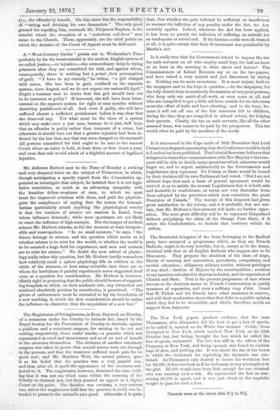Mr. Anberon Herbert sent to the Times of Monday a
striking and very eloquent letter on the subject of Vivisection, in which, though anticipating a speedy report from the Commission ap- pointed to investigate that subject, he insisted that it is not legis- lative restriction, so much as an advancing sympathy with the humbler fellow-creatures of man, to which we must trust for improved relations with them, and paid the physiolo- gists the compliment of saying that the reason the humani- tarians particularly attack anything like physiological cruelty is that the teachers of science are masters in Israel, from -whom influence descends ; while mere sportsmen are not likely to exert the influence of high example. But the temper of modem science Mr. Herbert attacks, as for the moment at least irrespon- sible and unscrupulous. " In no small measure," he says, " the future belongs to science, and the question which meets us is whether science is to exist for the world, or whether the world is to be counted a huge field for experiment, and men and animals are to exist for science." No doubt the new school of physio- logy really raises this question, but Mr. Herbert hardly remembers how relatively small a sphere physiology fills in relation to the -circle of the sciences, or how many scientific men there are to whom the lawfulness of painful experiments never suggested itself -even as a question for consideration. Mr. Herbert is, however, -clearly right in proposing that the public should beware of support- ing hospitals in which, on their academic side, any vivisection not rendered absolutely painless by anaesthetics, is permitted. "The givers of endowments must be entreated to lay the foundation of a new teaching, in which the first consideration should be rather the influence on character, than the acquisition of a new fact."


































 Previous page
Previous page